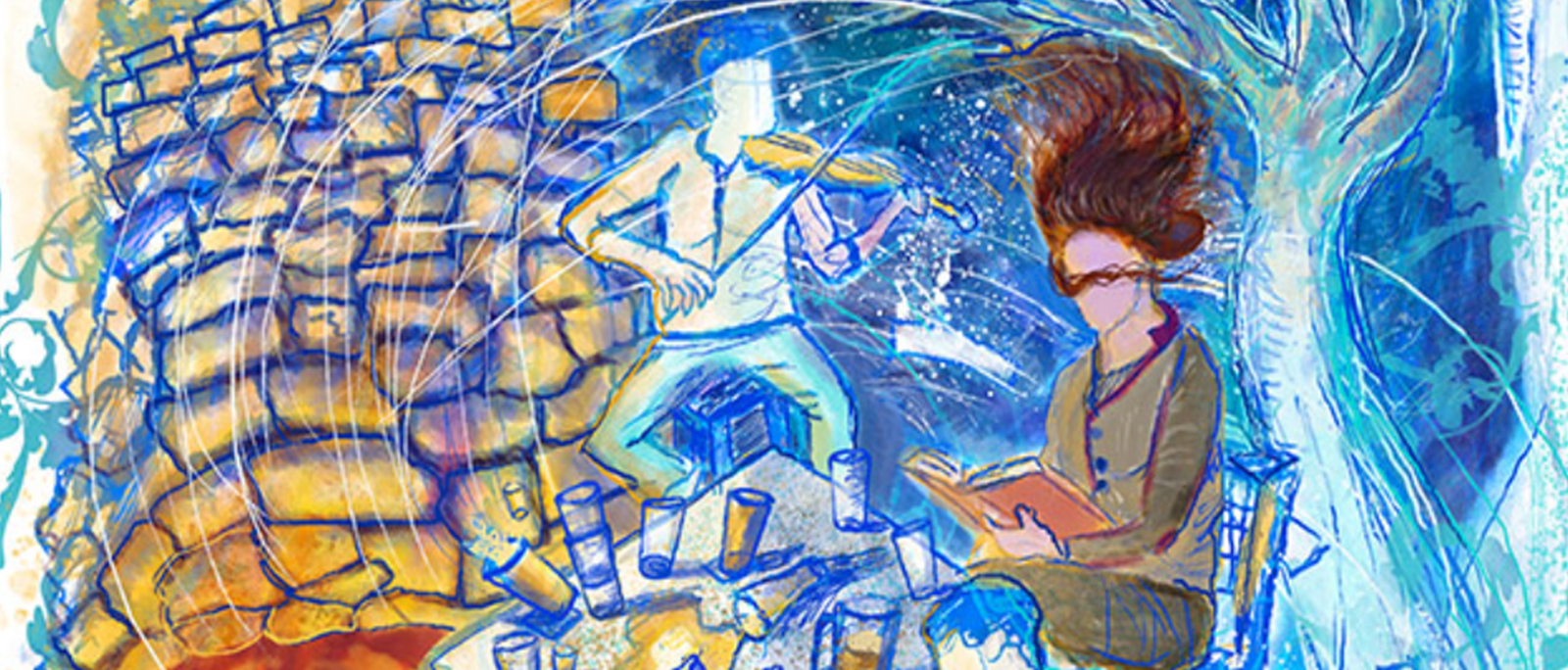Of Freedom and Folk Discourses
Listening at the table, The Strange Undoing of Prudencia Hart pops and fizzes with cultural specificity. The play opens with two dueling folk ballads—narrative poems meant to be read aloud to maximize their oral-formulaic techniques and evinced in pre-modern cultures the world over—that capture the different stakes attached to nature and death between the English and the Scots. In the former, a recently deceased knight is guarded over by a hawk and a hound, those animals central to defining courtly status and genteel skill. Eventually, a fair maid finds his body and buries it in order to stave off ravenous “corbies,” the Scotch word for crows. In this vision, “nature is essentially benign” and “the knight’s death does not change his place at the center of a world of love, loyalty, and human kindness.” Or so the footnote, narrated by Prudencia, goes.
The Scottish interpretation is much darker, colliding the dynamics of patriarchal power with a fundamentally disinterested environment. Fallen in a dike, that recessed area just within castle walls for all manner of fluid to drain, “lies a new-slain knight,” a medieval symbol typical of Scotland, France, and England to imply post-coital exhaustion. (Knights suffering thigh wounds in battle were, likewise, well-worn euphemisms for infertility.) No one knows of the knight newslain and still in the mire of his excretions except for “his hawk, his hound, and his lady.” Instead of tending to him, the three symbols of gendered status pursue instead their intended tasks of hunting in all its guises, including the lady, who “takes another mate.” While “many a one for him” inquires, he is never found. Time simply moves on; “we make our dinner sweet” and the wind continues to “blow forever more.”
The Scottish version is highly ambivalent, providing us many footholds to enter into its critique of the knight’s relationship with the natural world. One thing it offers is a key to Prudencia’s surname, Hart, the epitome of love imagery in Renaissance poetry. The hunt by the mature male deer, or hart, for the newly mature female deer, or hind, was the central image of unrequited love for the Italian inventor of the sonnet, Petrarch. Sir Thomas Wyatt adapted many of Petrarch’s poems to his own ends (not unlike the English conscription of the Scottish corbies), most famously in “Whoso List to Hunt?” (1577):
Whoso list to hunt, I know where is a hind,
But as for me, alas, I may no more.
The vain travail hath wearied me so sore,
I am of them that farthest cometh behind.
Yet may I by no means my wearied mind
Draw from the deer, but as she fleeth afore
Fainting I follow. I leave off therefore,
Since in a net I seek to hold the wind.
The speaker or beloved, the hart, chases a hind he knowns he cannot capture. The homonym of “hart” and “heart” is intentional here, both activated for any listening audience. The speaker knows he cannot capture his love, but also cannot leave the hunt, captured as he is by the desire for her. Like Paolo Uccello’s best-known painting, The Hunt in the Forest (1470), the thrust here is not in the particular desires or persona of the pursued beloved, the hind, but rather in the gendered, specifically male competition the chase of her makes possible. Wyatt’s speaker both warns off other men from the unsatisfying hunt, and indicates to them a certain covert knowledge.
With the completist vigor of any good academic, Prudencia is obsessed with such conscriptions of the artifacts of national heritage and, by extension, the appropriation of Scotland’s “collective psyche.” She embraces in the folk ballad that which unsettles our assumptions about the Scottish landscape—the highlands seemingly as inextricable from tourism adverts as the kilt. The snow in which she is enveloped seems almost plucked out of James Joyce’s seminal short story, “The Dead” (1914) about a similar scene in an Irish household, including the sacrifice of the depth and complexity of a woman’s memory and emotional life to male ego. The snow there is anything but “banal,” throwing up a stark contrast to the more nefarious aspects of nationalism and hospitality, where poverty and social stricture masquerade as drink and conviviality.
Dismissal of the footnotes in which Prudencia speaks, the apparatus for tracing intellectual bread crumbs, serves as a metonym for the dismissal of Prudencia’s values: that how we talk to one another, the stories we use to make sense of love and what happens after, matter. Couplets and alliteration build relationships throughout the play by granular acts of comparison, accreting over time like snow piling so that
If you surrender your thought to metre
You surrender yourself to the poem’s beat, or
Rhyme or formula or words or sounds
The author is lost and creation found
[ . . . ]
The tighter the form, the less control
We have over meaning or, you might say, soul.
Like the lais (the French interpretation of the ballad tradition) of the earliest female poets on record, Marie de France, the fairy world of King Arthur and his knights echo the political problems of the human realm. We require an imaginative space, full of poetry and rhythm, in order to ask necessary conceptional questions. Such questions are separate from practical ones, too often mire in a need for immediate application; for example, asking what motivates the devil to keep human company is really the first step in sorting out how to escape his landscape.
Prudencia Hart first premiered with the National Theatre of Scotland—a company notably, intentionally without a physical home—in the wake of a general election with the largest swing vote in Scottish history. It cut a path through the snow to the 2014 Scottish independence referendum where, to the shock of many, only fifty-five percent believed that Britain and Scotland were “Better Together,” to use the Labor campaign slogan. At the end of 2019, the United Kingdom remains entrenched in a two-year debate whether to withdraw from the European Union, itself formed as an antidote to nationalist extremisms that facilitated World War II. In this context of climate change, anti-intellectualism, and political conflict where UK coherence is yet again threatened as Scotland wishes to remain with the EU, the play resonates prescient conceptual questions, including how does knowing a tradition set us free?


